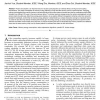Free Online Productivity Tools
i2Speak
i2Symbol
i2OCR
iTex2Img
iWeb2Print
iWeb2Shot
i2Type
iPdf2Split
iPdf2Merge
i2Bopomofo
i2Arabic
i2Style
i2Image
i2PDF
iLatex2Rtf
Sci2ools
136
click to vote
TPDS
2008
2008
An Energy-Oriented Evaluation of Buffer Cache Algorithms Using Parallel I/O Workloads
Power consumption is an important issue for cluster supercomputers as it directly affects running cost and cooling requirements. This paper investigates the memory energy efficiency of high-end data servers used for supercomputers. Emerging memory technologies allow memory devices to dynamically adjust their power states and enable free rides by overlapping multiple DMA transfers from different I/O buses to the same memory device. To achieve maximum energy saving, the memory management on data servers needs to judiciously utilize these energy-aware devices. As we explore different management schemes under five real-world parallel I/O workloads, we find that the memory energy behavior is determined by a complex interaction among four important factors: 1) cache hit rates that may directly translate performance gain into energy saving, 2) cache populating schemes that perform buffer allocation and affect access locality at the chip level, 3) request clustering that aims to temporally ali...
Related Content
| Added | 15 Dec 2010 |
| Updated | 15 Dec 2010 |
| Type | Journal |
| Year | 2008 |
| Where | TPDS |
| Authors | Jianhui Yue, Yifeng Zhu, Zhao Cai |
Comments (0)

